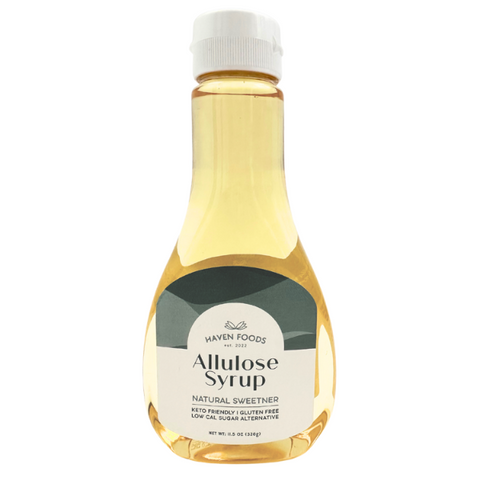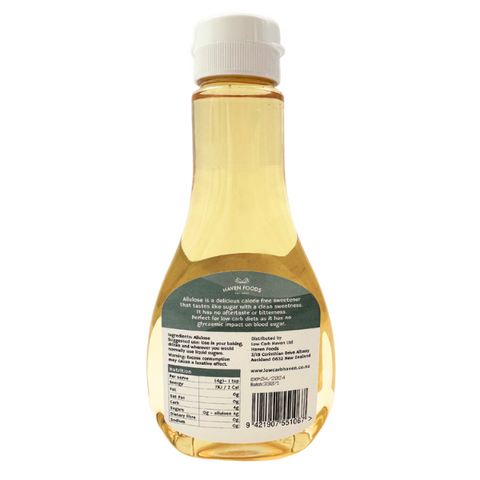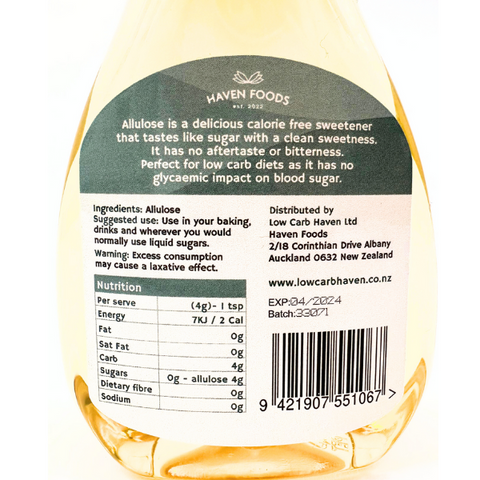



Haven Foods
CRYSTALLIZED Allulose Syrup 326g
Why Has My Allulose Syrup Crystallized?
Crystallization in allulose syrup is a natural phenomenon that can occur when the syrup experiences temperature changes during transit. This happens because allulose, like many natural sweeteners, has a tendency to form crystals under certain conditions—especially in cooler temperatures.
Is It Safe?
Absolutely! The crystallization does not affect the safety, quality, or sweetness of the allulose syrup. It remains 100% pure allulose, with no additives or impurities.
How Can I Fix It?
If you'd like to return the syrup to its liquid state, you can gently warm the container by placing it in a bowl of hot water or using a microwave in short increments. Stirring can also help dissolve the crystals.
Allulose Syrup is the perfect natural sweetener for low-carb and sugar-free recipes. With its natural sweetness and syrup-like texture, it makes a great addition to pancakes, porridge, sauces, and marinades. Allulose is a monosaccharide that's low in calories and has no glycemic impact for a healthier alternative to sugar.
A great substitute for honey and rice malt syrup.
Haven Foods Allulose is
- NON GMO
- Organic
- Made from Corn
WHAT IS ALLULOSE?
Allulose is a sweetener with a chemical structure similar to fructose (a sugar naturally found in fruit). It has 70% of the sweetness of sugar.
IS ALLULOSE SUGAR?
Allulose is technically a sugar — more specifically, it is a “rare sugar” because small amounts of it can be found in nature.
However, the FDA recognizes that allulose does not act like sugar. When you look at a nutrition label on foods that contain allulose, it will be listed separately rather than included in total and added sugars therefore you can remove it from the carb count
WHAT DOES ALLULOSE TASTE LIKE?
Since allulose lives in the same family as other sugars, it’s no surprise that it tastes like sugar! And unlike other popular keto sweeteners, allulose has no aftertaste or “cooling” sensation.
WHAT IS ALLULOSE MADE FROM?
Allulose is plant-based and occurs naturally in foods like dried fruit, jackfruit, figs, and maple syrup. For mass production, it’s made by fermenting natural sugars from plants, similar to the process of making kombucha – but there is no sugar remaining in the end product.
HOW MANY CALORIES IN ALLULOSE?
Allulose has 1/10 the calories of sugar: 0.4 calories per gram. Allulose calories are so minimal that your nutrition label will note the calorie count as zero for a typical serving.
DOES ALLULOSE RAISE BLOOD SUGAR?
Allulose has a glycemic index of zero and does not impact blood sugar levels. In terms of blood sugar impact, allulose ranks next to popular sweeteners like monk fruit and erythritol.
IS ALLULOSE GOOD FOR DIABETICS?
Not only does allulose have a neutral impact on blood sugar, it may also improve insulin sensitivity. Promising studies show that test subjects, after consuming allulose, had lower blood glucose levels [*, *].
IS ALLULOSE AN ARTIFICIAL SWEETENER?
Allulose is a natural sweetener. It’s not artificial because you can find it in nature, and even when it’s mass produced, this is done using a natural fermentation process.
ALLULOSE SWEETENER BENEFITS
In addition to its health benefits, allulose is one of the easiest keto sweeteners to use. It not only tastes like sugar, it acts like sugar.
Where other sweeteners stay gritty or harden too quickly, allulose can cook, caramelize, and dissolve… just like sugar. These qualities make allulose one of the best keto sweetener choices.
IS ALLULOSE SAFE?
The FDA have labeled allulose as GRAS (generally recognized as safe). There is no evidence to suggest that allulose is harmful to consume. Millions of people consume allulose regularly. FSANZ have said 'more assessment is needed before moving it from the "Novel food" category but there are many applications pending consideration. A few things that are considered novel foods- vape and chia seeds!
IS ALLULOSE HEALTHY?
Allulose is a natural sweetener linked to several health benefits. Studies on rats show that allulose may help reduce body fat, including belly fat.
Studies also link allulose consumption to a reduction in fat storage in the liver a condition that can otherwise lead to insulin resistance and diabetes.


